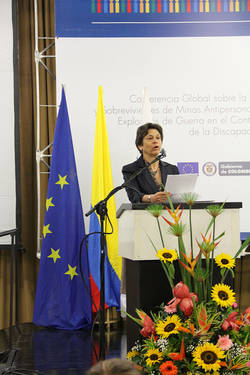04.04.2014
Download the press release | PDF 300KB
See a selection of photos on Flickr
Medellin and Geneva – The global conference on assisting landmine victims in broader domains Bridges between Worlds has wrapped up in Medellin, Colombia with the commitment by the anti-landmines and disability rights movements to work closer together.

“We gathered here with the purpose to build bridges between the human rights, mine action, disability rights and health care and other worlds,” said Colombian Vice-President Angelino Garzon who actively participated in the two-day international meeting that saw the participation of over 500 persons from over 35 countries.

“Discussions in this conference have made clear that there should be only one world – a world where physical and attitudinal barriers must be removed for the benefit of us all,”said Vice-President Garzon.
The conference highlighted in particular that the United Nations’ Convention on the Rights of Persons with Disabilities provides a framework for action that covers all persons with disabilities, including landmine survivors.
“The adoption of the Anti-Personnel Mine Ban Convention in 1997 was groundbreaking in containing an important promise to landmine survivors,” said Vice-President Garzon. “This was followed by the Convention on the Rights of Persons with Disabilities, which made it clear that persons with disabilities are holders of rights. It is the duty of all States to meet the needs of persons with disabilities and to do so in a concrete manner.”

“All aspects of the Convention on the Rights of Persons with Disabilities apply to the effort to assist and guarantee the rights of landmine survivors,” added Facundo Chávez Penillas of the United Nations Office of the High Commissioner for Human Rights.
“I am therefore pleased that a wide range of actors have made commitments at this conference to work closer together on what amounts to a common agenda. More and better can be done working together in pursuit of the same aims.”
“We need to go beyond benefits and towards the realization of rights,” said Rosangela Berman Bieler, Senior Adviser on Disabilities at UNICEF. “To achieve this, we need to invest in systems that are inclusive for all, including landmine survivors and other persons with disabilities. Both groups, which are in reality one, should work together now to influence the next development agenda towards inclusion.”
A specific proposal to work closer together was highlighted by Mozambique, which will preside over the Convention’s Maputo Review Conference in June, where updated actions to assist landmine survivors will be adopted.

“To date, we have had a committee on landmine victim assistance and that is why we proposed that this should continue in the form of an open-ended experts’ forum,” said Elias Zimba of Mozambique’s Permanent Mission to the United Nations (Geneva). “However, discussions within the context of the Convention need to be balanced with efforts to take the conversation on assistance to survivors in other domains."
"We have therefore proposed that the States Parties to the Convention appoint a Special Envoy on landmine victim assistance, to deepen our collaboration with the disability rights world,” said Elias Zimba.

Tanya Van Gool, Head of the European Union delegation in Colombia opens the meeting.
Funding for the conference is being provided by Colombia, several international Colombian partners and the European Union.
Through a Council Decision, the EU supports states in overcoming challenges in implementing the Convention, including the integration of landmine victim assistance efforts into broader disability contexts.
The results of Bridges between Worlds will be presented in Geneva by the Colombian delegation attending the Convention’s Intersessional Meetings.
The outcomes of this conference are also expected to significantly contribute to preparations for the Maputo Review Conference.
The Convention was the first disarmament instrument to take into consideration the rights of the survivors of a particular weapon.






